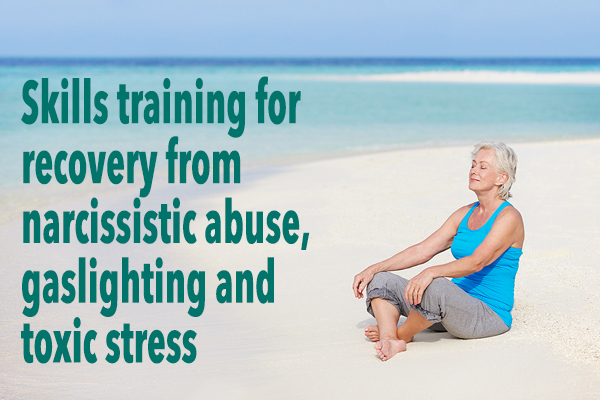
About this course
You’ve been manipulated, exploited and betrayed, and you’re shocked to realize that it was all intentional. How do you recover from a narcissist, antisocial or psychopath? How do you move forward in your life after narcissistic abuse?
That’s exactly what you will learn in this Lovefraud webinar series taught by Dr. Liane Leedom, a psychiatrist and a professor of counseling and psychology at the University of Bridgeport. She knows what you’ve experienced, because she was targeted by a psychopath herself.
This is the first treatment protocol developed specifically for overcoming the trauma of narcissistic abuse. Dr. Leedom has created a revolutionary approach utilizing the skills training of dialectical behavioral therapy (DBT) and tailoring it to the experience of survivors like you. Lovefraud is pleased to offer you this groundbreaking and cost-effective program for true recovery.
About the instructor Dr. Liane Leedom
 Liane J. Leedom, M.D., is author of Just Like His Father? A Guide to Overcoming Your Child’s Genetic Connection to Antisocial Behavior, Addiction and ADHD, and Women Who Love Psychopaths: Investigating the Relationships of Inevitable Harm. She is also author of multiple peer-reviewed studies, including Counseling Intimate Partner Abuse Survivors: Effective and Ineffective Interventions; The Dominance Behavioral System and Psychopathology: Evidence from Self-Report, Observational and Biological Studies; The Problem of Parental Psychopathy; and Did He Ever Love Me? A Qualitative Study of Life with a Psychopathic Husband.
Liane J. Leedom, M.D., is author of Just Like His Father? A Guide to Overcoming Your Child’s Genetic Connection to Antisocial Behavior, Addiction and ADHD, and Women Who Love Psychopaths: Investigating the Relationships of Inevitable Harm. She is also author of multiple peer-reviewed studies, including Counseling Intimate Partner Abuse Survivors: Effective and Ineffective Interventions; The Dominance Behavioral System and Psychopathology: Evidence from Self-Report, Observational and Biological Studies; The Problem of Parental Psychopathy; and Did He Ever Love Me? A Qualitative Study of Life with a Psychopathic Husband.
Read Dr. Leedom’s studies at ResearchGate.
In addition to her university research and teaching, Dr. Leedom is currently in private practice as a psychiatrist. She trained in medicine at the University of California, Los Angeles, and at the University of Southern California, Los Angeles. She previously served on the medical staff of several Connecticut facilities, including St. Vincent’s Medical Center, Hall-Brooke Behavioral Health Services, the Hospital of St. Raphael and the Center for Optimum Care.
Want to know more about the series? Following is information about each of the modules!
Skills Module 0: FREE! Your first step towards real recovery from narcissistic abuse and trauma
Narcissists, antisocials and psychopaths are predators, and once they catch you, trauma bonds keep you stuck. You’ll learn why disordered individuals behave the way they do, and why it’s so hard to get over the betrayal. Dr. Leedom introduces two survival principles and previews skills that will enable you to rebuild your life.
Highlights
- Yes, recovery from narcissistic abuse is possible
- Why sociopaths crave power and can’t love
- How you fell in love with the sociopath
- Overview of four dialectical behavioral therapy skill sets
- Dialectics: Opposite truths that stand together
More info, including program agenda
Skills Module 1: Mindfulness to clear your head of sociopathic gaslighting
When the sociopath’s gaslighting has left your mind racing and emotions in turmoil, mindfulness teaches you that you are not your thoughts. Learn to calm your mind, soothe your senses and let go of emotional suffering.
Highlights
- After the sociopath, how mindfulness can restore your sanity
- Goal of mindfulness — to reduce suffering and increase happiness
- How to focus on being completely present in this one moment
- How to observe and release painful emotions
- The importance of validation for improved relationships
More info, including program agenda
Skills Module 2: Recovery from the bodily effects of toxic stress
You are emotionally overwhelmed but the demands of life must still be met. You have intense pain that can’t be resolved quickly. This is when you need crisis survival skills to help you slow down, calm down and think. Dr. Liane Leedom teaches you what to do.
Highlights
- How toxic stress prevents you from seeing reality
- Crisis survival skills and how to use them
- Pros and cons of acting on crisis urges
- Radical acceptance — complete and total acceptance of what is
- Radical acceptance is willingness to do just what is needed
More info, including program agenda
Skills Module 3: Strategies for reducing emotional distress and vulnerability
Involvement with a sociopath is emotionally brutal. Still, mindfulness enables you to regulate your emotions, so you can decrease your suffering and vulnerability. Learn strategies for changing your emotional responses, even in tough situations.
Highlights
- How to reduce emotional distress and toxic stress so you can fully see reality
- Negative feelings are bad and other myths about emotional regulation
- Understanding and describing emotions
- Emotional regulation through problem solving, step by step
- Strategies for building a life worth living
More info, including program agenda
Skills Module 4: Evidence-based tools for dealing with sociopathic behavior
Why is sociopathic behavior so shocking? Because it violates your longstanding beliefs about what it means to be human and how people should act. Therefore, when you have no choice but to deal with sociopaths, you need different skills and approaches. That’s what you’ll learn.
Highlights
- How to be skillful in getting what you want and need from others
- Clarifying your goals in interpersonal situations
- FAST guidelines — how to act in ways that preserve your self-respect
- Barriers to interpersonal effectiveness
- Ending destructive relationships
More info, including program agenda
Skills Module 5: Post-traumatic growth and spirituality
The sociopath’s betrayal was devastating, but with the skills you learned, you can overcome the pain. By abandoning unhealthy mind sets and cultivating wisdom, you can achieve self-transcendence — the final stage of adult development.
Highlights
- Thriving despite being linked to psychopathy
- Review of the program’s wellness skills
- Self-transcendence: The final stage of adult development
- Self-transcendent emotions: Gratitude, compassion, awe
- Spirituality: Finding meaning and staying grounded
More info, including program agenda
Cost and credits
Dr. Leedom’s program has an introduction and five modules that will get you well on the road to recovery. The value is $400, but Lovefraud wants help you recover, so we’re offering it to you for only $149. Once you purchase the course, you can access it online as long and as often as you want.
Although this course does not award continuing education credits, you will be able to download a certificate of achievement upon completion.
If you’ve tangled with a sociopath (psychopath, narcissist), your brain has been fried and your heart has been shattered. But true recovery is possible. Learn the skills to achieve it.
Customer reviews
Add your review — click and scroll down


I am still working through the material but this course is a must for anyone suffering post narcissistic, sociopathic and psychological abuse. The recovery tools are extremely helpful. The hosts have LIVED the experience in addition to having credentials. I’m am curious to see what else they offer! Highly recommend!
This course is evidence-based and informative. Donna and Liane understand the interpersonal dynamics of sociopaths. They provided the space to process and practice new skills that are helping me navigate through a tough time. Thank you!
Dr. Leedom’s course is unique and rare, yet very much needed, training and educational resource for complicated problem of emotional trauma.
Dr. Leedom is an expert in the field with deep understanding of the clinical problem as well as sound training and research experience in neurobiological process that leads to creation of a trauma response. In her series, not only she gives her audience the tools to manage the acute emotional stress and consequences of mental trauma, but also puts this clinical problem into context of a broader understanding of the pathological human interactions from evolutionary perspective.
I would recommend Dr. Leedom’s course not only to general public and mental health experts, but also to other professionals, like teachers, doctors, and legal experts, as a valuable information about the impact of an abusive behavior on human mind.
Dr Leedom and Ms Andersen have a first-rate program. This course connects you with what is likely the premier source for help for anyone who encounters a psychopath or a sociopath. I do not think there is another group like theirs – possibly world-wide.
Hi. Much of the information and skills re: DBT, CBT, etc. I am very familiar with from prior therapy, both outpatient and inpatient. I agree with the value of these skills and resources, although, just like many other resources, they are difficult to grab ahold of during an episode, stressful moment, conversation, or trauma causing (triggering) event. Role playing is helpful to gain the best chance of being competent in using them in real life.
I enrolled in the course due to my recent meeting of someone who displays sociopathic traits. What was unexpected, and incredibly valuable, is the revelation that my mom is a narcissist. This is answering so many questions I’ve had over my 64 years. I had no clue. I completely overlooked the possibility that she had a disorder. I knew she wasn’t very maternal, caring, compassionate or empathetic, however I always made excuses for her behavior or protected her. Now I am beginning to get clarity on so much. Oh my goodness, all of us, seven children, so much trauma and pain. Even still.
I shared some of what I learned last week with my physical therapy assistant. She was very moved by it. When she had a moment, she sat with me and shared that she has not spoken to her mom in five years. She has identified her mom’s behavior as narcissism. She is much younger than me. Her only sibling, brother, along with Aunt’s, Uncle’s and cousins are taking the mom’s side and lashing out and shaming her for not ‘forgiving and having a relationship with her mom’. Oh gosh, I was so glad to offer her some understanding and kindness/compassion. I shared your site information with her.
As usual, my path to you is not random and has a beautiful purpose to bring healing from pain. I am grateful.
Thank you.